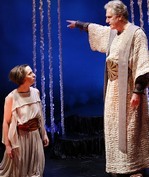SITE GUIDE
SEARCH
REVIEWS
REVIEW ARCHIVES
ADVERTISING AT CURTAINUP
FEATURES
NEWS
Etcetera
LISTINGS
Broadway
Off-Broadway
etcetera- NEWS
BOOKS and CDs
OTHER PLACES
See links at top of our Main Page
QUOTES
TKTS
PLAYWRIGHTS' ALBUMS
LETTERS TO EDITOR
FILM & TV
LINKS
MISCELLANEOUS
Free Updates
Masthead
A CurtainUp Review
The Burial At Thebes
|
Nobody can be sure they're always right.—
Haemon
|

Rebekah Brockman as Antigone, Paul O'Brien as Creon
(Photo Credit: Carol Rosegg)
|
Perhaps we can't identify as much with the then-public approval of slavery, misogyny, and authoritarianism to the exclusion of all else, but we can certainly understand the emotional motivations behind a character like Oedipus's pride, determination, and subsequent fall. So Seamus Heaney's 2004 The Burial at Thebes, an attempt to update Sophocles' Antigone to connect it and the arrogant leader it portrays to George Bush's disastrous adventurism in Iraq, is understandable. I just wish that in the process he, and the Irish Repertory Theatre which is giving the play its first American production, brought more to the table than just a well-rendered translation.
Part of the problem may rest with the original tale itself. One of the most commonly taught plays on the high school level, Antigone tells the story of the doomed offspring of Oedipus, who in the first play of Sophocles' trilogy discovers that he has killed his father and married his mother, fulfilling a prophecy he had desperately attempted to escape. In this concluding play of that set, his two sons have killed each other in a civil war for the control of Thebes, and Polyneices, brother on the losing side, is declared a traitor by his uncle and king Creon (Paul O'Brien), who decrees that his body will receive no burial and is to be treated like carrion. Sister Antigone (Rebekah Brockman) is horrified. Cespite the protestations of her sister Ismene (Katie Fabel) Zngibond decides to defy the edict and bury her brother, to Creon's bemusement and rage.
It's a relatively straightforward and simple plot, which is a big part of its appeal to the high school classroom. But that simplicity, and the sometimes inexplicable motivations of its characters, keeps it from hitting the high notes of the towering masterpiece of Oedipus Rex . . .which is all the more reason why Heaney's reworking strikes me as a little odd. Because this really is basically a straight translation of the original play; other than a few nods to 2004 politics ("Whoever isn . . 't for us / Is against us," declares Creon), there isn't much new here at all.
While comparing Creon's overwhelming rigidity in the face of all logic and common sense to Bush's similar makeup may be apt, I'm not sure that it tells us anything new—especially now, eight years after the latter left office, when modern circumstances and concerns have largely changed. In other words, despite the spare beauty of Heaney's language, it's all kind of obvious, and the production itself more or less goes along with this approach.
All the actors are fine, and Brockman and O'Brien do a credible job of representing two ideologues with no inclination to compromise, the latter (O'Brien is to be commended for valiantly ascending the throne when Larry Bryggman left at the holiday break — after himself taking over for the prevnously announced John Cullum who ran into a conflict with his appearance in Christmas in Wales).
Winsome Brown's Eurydice's reaction to the news of her son and niece is powerful. Similarly, the direction (Charlotte Moore) is competent, though I was a bit bemused by the decision to leave some — not all, and with no particular rhyme or reason — of the actors with Irish brogues. Nothing in particular stands out, and the costumes and set are amateurish and uninspired at best (why even bother with hanging ropes from the ceiling to the floor, getting in the way of the actors, if they will be neither used or remarked upon by anyone?).
I don't mean to suggest that this is a bad production. Some of the elemental power of raw emotion remains, and of course Heaney was a superb poet. But by the time Creon appears crawling on the floor, desperate in his grief over the losses he has himself created, we ought to feel exhausted, driven down by the impact of what we've witnessed. Instead we are simply politely intrigued, and I view that as a missed opportunity for both a play and production which could, and should, have gone for more.
|
The Burial at Thebes Playwright: Seamus Heaney, Director: Charlotte Moore Cast: Ciaran Bowling (Haemon), Rebekah Brockman (Antigone), Rod Brogan (Messenger), Winsome Brown (Eurydice), Katie Fabel (Ismene), Colin Lane (Guard), Robert Langdon Lloyd (Tiresias), Paul O'Brien (Creon) Set Design: Tony Walton Costume Design: Linda Fisher Lighting Design: Brian Nason Sound Design: Zach Williamson Running time: Seventy minutes DR2 Theatre, 103 East 15th St., (212) 727-2737 Website: http://www.irishrep.org From 1/14/2016 to 3/6/2016, opening 1/24/15 Tuesday & Thursday @ 7 p.m., Wednesday, Friday-Saturday @ 8 p.m., Wednesday, Saturday-Sunday @ 3 p.m. Tickets: $70 general admission Reviewed by Dr. Gregory A. Wilson based on January 22nd preview performance |
|
REVIEW FEEDBACK Highlight one of the responses below and click "copy" or"CTRL+C"
Paste the highlighted text into the subject line (CTRL+ V): Feel free to add detailed comments in the body of the email. . .also the names and emails of any friends to whom you'd like us to forward a copy of this review. For a feed to reviews and features as they are posted add http://curtainupnewlinks.blogspot.com to your reader Curtainup at Facebook . . . Curtainup at Twitter Subscribe to our FREE email updates: E-mail: esommer@curtainup.comesommer@curtainup.com put SUBSCRIBE CURTAINUP EMAIL UPDATE in the subject line and your full name and email address in the body of the message. If you can spare a minute, tell us how you came to CurtainUp and from what part of the country. |


 Book of Mormon -CD
Book of Mormon -CD